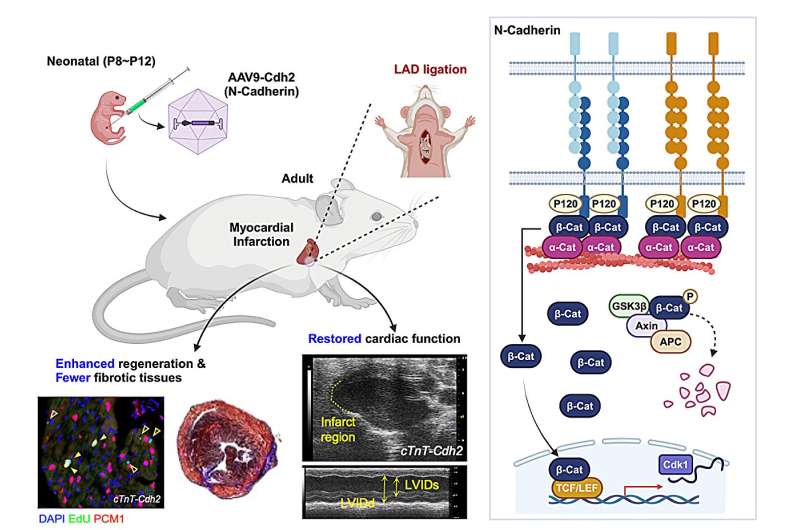This article has been reviewed according to Science X's editorial process and policies. Editors have highlighted the following attributes while ensuring the content's credibility:
fact-checked
peer-reviewed publication
trusted source
proofread
Healing the broken heart: How a key junctional protein may unlock the potential of cardiac regeneration

Adult human hearts possess limited regenerative abilities, so losing cardiomyocytes (CMs) after injury can result in contractile dysfunction and heart failure. In contrast, neonatal mammalian hearts can regenerate, though the underlying molecular mechanisms remain unclear.
Through comparative transcriptome analysis, Professor Kai-Chien Yang's group identified the adherens junction protein N-Cadherin as a key regulator of CM proliferation and renewal. Its expression, which correlates positively with mitotic gene activity, decreases with age. The study is published in Nature Communications.
In neonatal mice, injury induces an increase in N-Cadherin levels that coincides with enhanced CM mitosis. Experimentally, reducing N-Cadherin expression diminishes CM proliferation in both neonatal mouse hearts and human-induced pluripotent stem cell-derived CMs, while overexpressing it boosts proliferation.
Mechanistic studies reveal that N-Cadherin interacts with and stabilizes the pro-mitotic transcription regulator β-Catenin, thereby driving CM self-renewal.
In addition, targeted deletion of N-Cadherin in CMs impairs cardiac regeneration in neonatal mice, leading to excessive scarring, whereas its overexpression promotes regeneration in adult mouse hearts following ischemic injury.
"These findings suggest that targeting N-Cadherin could be a promising strategy for enhancing cardiac regeneration and restoring function in injured adult human hearts," Professor Yang says. "And this may offer hope for improving outcomes for heart failure patients."
More information: Yi-Wei Tsai et al, N-Cadherin promotes cardiac regeneration by potentiating pro-mitotic β-Catenin signaling in cardiomyocytes, Nature Communications (2025). DOI: 10.1038/s41467-025-56216-y




















